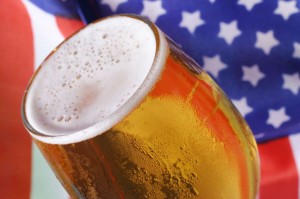Rules Are for Schmucks: One Nation, Drinking Booze
 Photo by odelia / 123RF
Photo by odelia / 123RF The latest setback in the legal campaign to remove the words “under God” from the Pledge of Allegiance gets me thinking about … product placement.
You all know what that is: the effort to promote sales of goods or services by planting them in a movie, a television show, a song, or some other vehicle that attracts people’s attention, but outside the boundaries of what is normally considered the advertisement portion.
One famous example is the use of Reese’s Pieces in the 1982 movie E.T. the Extra-Terrestrial, in which Elliott lures the alien out of hiding by leaving a trail of the little delicacies. Sales of Reese’s Pieces jumped 65 percent after the film was released.
The Pledge of Allegiance, as first written by a Baptist minister in 1892, utterly failed to take advantage of a golden product placement opportunity. Every student had to say it every day, yet it attempted to sell nothing at all. What a tragic waste!
In the early 1950s, promoters of the God industry noticed the omission and began doing something about it. First they started changing the Pledge themselves, inserting their advertising message where the law of the land said it should not be. Then in 1954 they used their political influence in Washington to get the Pledge officially changed. Since then, every school child, every day, has been brainwashed with the message that there is a God, and we’re somehow under it. Want to know more about this God we’re under? It’s as easy to find out from the God retailers (for a price) as it is to purchase Reese’s Pieces.
Never mind that Americans won two World Wars and faced down the darkest days of the Great Depression and the Cold War reciting a Pledge that all people, religious or otherwise, could support with equal fervor. Money talks.
This doesn’t bother me—I just think we need to be more efficient about it. Let’s look at some actual data before we decide, as a nation, which product our Pledge of Allegiance should sell.
When I look at the data, I see that America gave some $298 billion to charity in 2011, with 32 percent of that (about $95 billion) going to religion. Impressive, but not as much as some other sectors of our economy: the Census Bureau says that Americans spent some $167 billion on alcoholic beverages in 2009.
Drinking is every bit as American as religion—even more so. Recent statistics show that 67 percent of Americans regularly consume alcohol, far higher than the percentage who regularly attend church. Those same statistics show that drinking is on the rise while religion is in freefall. Historically a number of our Founding Fathers were skeptical of religion, but they were nearly all drinkers. Jefferson had his winery, Samuel Adams produced not beer but fine malt, and George Washington’s Mount Vernon whiskey distillery was the largest in the country. In 1787, two days before they signed off on the Constitution, the fifty-five delegates to the Constitutional Convention partied at a Philadelphia tavern where they polished off fifty-four bottles of Madeira, sixty bottles of claret, eight of whiskey, twenty-two of porter, eight of hard cider, twelve of beer, and seven bowls of alcoholic punch. Do the math!
My problem is with the 33 percent of Americans who don’t drink. They are a serious drag on the economy—think how many more jobs we’d create if that $167 billion figure could be magnified, not just direct jobs in production and distribution, but all the corollaries: doctors who get paid for treating liver disease, lawyers who get paid for DUI cases … it all adds up.
“But,” some would stammer, “religion is good for people, and drinking is not!” I beg to differ. As Clarence Darrow put it, “Take out of this world the men who have drunk, down through the past, and you take away all the poetry and literature, practically all the works of genius that the world has produced. What kind of a poem do you suppose you would get out of a glass of ice water?” In fact, portions of what you are reading now … but I digress.
If we could change the sales language in the Pledge our children recite every day, so that it reads “…one nation, drinking booze, indivisible…” that would have a huge positive impact over time on the social acceptability of drinking, resulting in an equally huge boost for our economy. The current language just isn’t working, as witness the decline in all the relevant religion statistics.
Or, we could get all prissy about it, decide that there ought not to be any product placement language in the Pledge at all, and that it ought to be a simple statement of shared patriotism that every American can proudly recite—as it was when Rev. Francis Bellamy first wrote it, back in 1892:
I pledge allegiance to my Flag
and the Republic for which it stands,
one nation indivisible,
with liberty and justice for all.
